 The Saturday before last I was interviewed on Air America's Ring of Fire with Robert F. Kennedy Jr. and Mike Papantonio concerning my call for the Election Reform Bill (HR811) by Rep. Rush Holt (D-NJ) to be amended to include a full ban on Direct Recording Electronic (DRE, usually touch-screen) voting systems.
The Saturday before last I was interviewed on Air America's Ring of Fire with Robert F. Kennedy Jr. and Mike Papantonio concerning my call for the Election Reform Bill (HR811) by Rep. Rush Holt (D-NJ) to be amended to include a full ban on Direct Recording Electronic (DRE, usually touch-screen) voting systems.
The interview was pre-taped, and an edited-for-time version was aired. The complete, unedited version of that 15 minute interview, along with a text-transcript is now posted here.
This past Saturday, Ralph Neas, the president of People for the American Way (PFAW), one of the groups supporting the Holt Bill as is, and fighting against a ban on DRE voting systems, was interviewed on Ring of Fire. I had been critical of PFAW's unwaivering support of the bill during my interview the week before (as I have been in many articles here and elsewhere), so Bobby Kennedy asked Neas, a number of times, to answer directly to some of my criticisms.
 The audio of that interview as well as a text-transcript, is also now posted here.
The audio of that interview as well as a text-transcript, is also now posted here.
Now before I get to a huge number of concerns about the Neas interview and what I see as the dangerous PFAW position, and not to stack the deck (but I will anyway), Papantonio concluded his interview with me as follows, which I then promised to quote on the blog, so here it is...
BRAD: Yeah...
PAPANTONIO: I have followed your career, and I followed you on these issues, from day one almost. I am involved in litigation as you know. If I'm betting on anybody to be right, it's you. Now what I want you to do is let your people know that. Somehow --- your blog is incredible, I think it's the most incredible blog out there on this issue --- let 'em know that people that are actually involved in the litigation, that we think you're right. We think you're right.
There is no way...it is meaningless to create a "paper trail" if the "paper trail" can't be recovered inside the machine, inside the mechanism and we can't see something that's left a mark, if it has not left a mark in that machine, forget it. It's GOP thuggery politics as usual.
Brad, I want to thank you for joining us as usual...Ya know, every time I talk to you, you have the information. My bet is on you on this one. Thanks a lot.
BRAD: Thank you, brother. I'll quote ya on the blog.
PAPANTONIO: Alright, appreciate it.
With that promise kept, on to the extraordinarily troubling Neas interview.
First, let me be clear: While I appreciate Neas and PFAW's advocacy for Election Reform in America, the bottom line is that they are drop dead wrong on the issue of whether we should allow dangerous, disenfranchising DREs for use in our electoral system.
So are the other large public-advocacy groups who are marching behind PFAW on this, including Common Cause, MoveOn, VoteTrustUSA and others.
That PFAW is actually advocating in favor of DRE use in our electoral system --- as you'll see in Neas' interview --- is simply astounding and beyond my capacity, thus far, to understand. But I have tried.
I have worked long and hard, quietly in the background, with people from all of the above named groups in hopes of finding common ground. I don't like public rifts between "the good guys", which I consider all of those folks to be, especially since such a fight only tends to serve the true bad guys in this fight (voting machines companies, elections officials who won't admit they screwed up by buying into the voting machine company lies, etc.). But I have been unsuccessful. All of those groups named above are still sticking with Holt, it seems, come hell, highwater, scientific evidence, reasoned argument, common sense and even against what most of them actually know to be the right thing.
I've had a number of lengthy telephone and email conversations with both Neas and their lead election policy attorney, David Becker, as well as others at PFAW on this matter, in order to try and find out why they continue to support a technology which mountains of scientific evidence has shown to be an unmitigatable menace to democracy. In all such conversations with them, productive and cordial as they were, they have time and again failed to offer any actual science or empirical study to back up their position. They've offered little more than anecdotal evidence, at best, to support their continued assertions that "DREs better serve the blind, disabled and language minority communities."
Further, in Neas' RoF interview last Saturday, he actually indicated that he might like to see Los Angeles (where I live!) convert from our current paper-based ballot system to an all-DRE system!
To say the least, I'm greatly troubled by that.
I'm further troubled by the fact that Neas also, whether purposely or not (I know that Holt's office has been putting out a great deal of misinformation about their bill, and yes, I can prove it) misrepresented a number of the provisions of the Holt bill on national radio. Big time.
Though I admit to being wholly stymied by PFAW's continued, unsupportable position --- even while other groups who once supported DREs have since had the courage and common-sense to change their tune after seeing the dangers and failures of DREs first hand, as thousands, if not millions, were disenfranchised by these god-forsaken machines during the 2006 election cycle --- I will not suggest any nefarious intentions behind PFAW's support of the Holt bill as written. Namely, because I have no evidence to support any such nefarious intentions behind their support, and I only report what I can actually prove.
I presume that PFAW honestly believes in what they are advocating, despite the complete lack of demonstrable evidence to back up their position, and despite my best efforts to supply them with a mountain of actual evidence to show that they are simply wrong.
Unfortunately, PFAW has the big guns on Capitol Hill, the access, the mailing-list numbers, the regular access to the mainstream media and a multi-million dollar budget to make it all happen. I've got me, a blog where I'm forced to beg for small donations when I can (like that), a bunch of tireless fellow rag-tag citizen patriots around the country on my side and fighting like hell-fire for Election Integrity any way that they can and, in this case, we happen to have the facts and the truth on our side.
Let's hope that will eventually win the day.
But first, before I get really tough on PFAW here --- as this is damned dangerous stuff which I see them as recklessly advocating for --- the niceties...
THE NICETIES...
"Bobby Kennedy Jr., Brad Friedman and Ralph Neas all agree on this part: comprehensive election reform is the top legislative priority facing the country right now," Neas said near the top of last weekend's interview. I both agree with him, and appreciate his sentiments there.
Later, Bobby then went on to ask Neas directly about a number of the points about which I've been critical of both the Holt Bill and PFAW's support thereof.
(DISCLOSURE: I will again point out that I had a hand in helping Holt's office write the legislation, as they kindly allowed me the opportunity to review drafts, give feedback, suggest language changes and the additions of key new provisions. Many of those suggestions and provisions were included in the final bill, though not all of them --- including my persistent urging that they add language which would ban DRE systems from use.)
"Bobby, very importantly, I'm a fan of Brad Friedman," Neas responded after he was asked directly about my concerns. "I think he's a patriotic American. I think he really is committed to providing accessible, secure voting systems and we've talked to him for hours, Bobby, and they're always good conversations."
Again, I thank Neas for the comments, and assure you that I too appreciate his hard work in favor of Election Reform. I have extremely supportive on these pages, over the last several months, of PFAW's work on the FL-13 Jennings/Buchanan election contest, for example. I will, of course, continue to support their work there and wherever else it merits such support.
During the Neas interview, Bobby characterized me as "one of the Paul Reveres" of the Election Integrity movement, which I certainly appreciate as well.
And with that now out of the way...
NEAS' FIRST INACCURACY: "The Holt bill provides for paper ballots"
With all of those niceties, out of the way then...Neas goes on to say, when asked by Bobby to describe some of my concerns about the Holt bill as drafted, that I "would argue that paper trails are different than paper ballots and [that] this bill doesn't truly require paper ballots."
The "Holt bill provides for paper ballots," Neas asserted earlier in the interview, adding later that those paper ballots, "whether optical-scan or DRE, they're treated the same way under the Holt bill"
No. They're not. Though the Holt bill, in this latest iteration, describes all paper records as "paper ballots", it does not require that all of those "paper ballots" actually be paper ballots.
True paper ballots are actually tabulated --- either by optical-scan or hand. But they are tabulated.
DRE paper trail records, however --- which the Holt bill misleadingly refers to as "paper ballots" --- will never actually be tabulated by anybody or any thing on Election Night as the bill is currently written. And only a tiny minority (usually 3%) will ever be tabulated by anybody or any thing --- and that will only be days after the Election is already over --- in an audit process.
As well, there was a provision slipped into the Holt bill in the final draft that would allow 0% of DRE paper trails to ever be counted by anybody or any thing in cases where a race was close enough to trigger an automatic state-mandated recount. In other words, precisely when such an audit might be needed the most (and I'd argue it's always needed if ballots are to be counted by notoriously inaccurate optical-scan machines) no manual audit of any paper record, ballot or trail, need ever be done, according to Holt.
Neas again, in indented text:
"Either under the opti-scan or DRE, they both produce paper ballots..."
Simply untrue. Unless you mean that a "ballot" in an American election is something which will most likely never actually be tabulated by anybody or any thing.
"...They are both fed into the software..."
Absolutely untrue. While a paper ballot might be scanned by an optical-scan machine, or otherwise counted by hand, a paper trail produced by a DRE is not "fed into the software". It is never counted at all. Instead, the results of the election are taken from an internal, invisible machine count of an electronic representation of the voters selections which are never verified by the human voter.
PLEASE NOTE: It is simply impossible for any human being to verify an electronic ballot as tabulated inside a DRE system.
"...under the Holt bill, the voter has an opportunity to verify it, number one..."
Wrong again. As mentioned, an electronic ballot on a DRE can never be verified by the voter or any other human being (not even Superman). The only thing they can verify on a DRE is a paper trail. One that is not used for tabulation of election results and which, as studies such as those done by MIT and others, have revealed that most voters do not even bother to verify.
"...and number two, if there's an audit, then the audit has to look at the paper ballot..."
Note his "if". He's correct, if there's an audit, the audit will look at a tiny portion of the paper trails or the paper ballots, whichever one exists. However, they will never look at more than 10% of those trails or records and in most cases 97% of them will go completely unaudited. Worse, in some cases, as mentioned above, 100% of them will go unaudited and perhaps even uncounted in the first place by anybody or any thing.
"BRAD WANTS TO BAN TOUCH-SCREENS" --- No he doesn't.
Bobby then says (not wholly accurately, but he may not know better) that "Brad wants to ban touch-screens."
Neas, who certainly should know better, then agrees, and discusses the "scores of disabilities organizations and language minority groups" who PFAW works with, in order to suggest that such groups favor DREs either because of their accessibility for disabled voters, or the ability to provide ballots in different languages.
Setting aside that, as it turns out, paper ballots are also now printable in every language, the sleight-of-hand that Neas accomplished in agreeing that I wish to "ban touch-screens" is no small semantic point.
By suggesting that "touch-screens" are the same as DREs in this context, and are either needed or preferred by disabled and language minority voting advocates as he named above, he has avoided the very linchpin of this debate. And it's no small linchpin.
TO CLARIFY (and please read this carefully!): A DRE, by its definition, directly records the voters selections internally, inside the computer, onto computer memory, without allowing the voter to verify it. A DRE often uses a touch-screen interface. However, some touch-screen systems like the AutoMARK --- which are perfectly acceptable for disabilities voters who wish to use them --- are merely ballot marking devices or electronic ballot printer/markers with a touch-screen interface. They do not tabulate the vote or create an unverifiable record of the vote as DREs do. They simply assist a disabled voter and print out a ballot with their selections to be verified by the voter, and then counted by another means, such as op-scan or hand count.
If Neas and PFAW and the groups he says they work with truly want accessible, verifiable voting interfaces for such voters, a system which has a touch-screen interface, but does not dangerously tabulate unverified and unverifiable votes, is perfectly fine for optional use by such voters.
Neas then goes on to repeat the old "disabilities and language minorities" canard, about which I've written and spoken many times --- including to Neas himself in a lengthy phone call with him and several other PFAW folks a little over a week or so ago.
He says:
"The people who have been on the ground, for decades, working with these machines, prefer the DREs if they represent the disabilities organizations or the language minority organizations."
Wrong. Those groups who "prefer the DREs" are either misinformed about them, and unaware that there are alternative ballot marking devices available (such as I've described above) which provide the same accessible interface, but do not pose the same unacceptable risks as DREs, or --- like the National Federation for the Blind (NFB) and the American Association of People with Disabilities (AAPD) --- they have received money from the voting machine companies themselves and are therefore, wholly compromised in this debate and should not be a part of it. (NFB has received $1 million from Diebold, and Jim Dickson, who frequently testifies to Congress and has extraordinary access on behalf of AAPD has taken at least $16,000 from voting machine companies, according to the NY Times...Both groups have been fiercely advocating for them ever since, and Dickson has gone as far as to insist, for years, that all voters must use DRE systems without even "paper trails" on them!)
Many of the folks who haven't taken money from the voting machine companies, like blind technology expert Noel Runyan who, I'm now told will thankfully now be testifying before a Congressional hearing this Friday, have called for "an immediate ban" on the use of DRE systems. He has led the way with advocates from the community, in an attempt to counter the NFB and AAPD garbage, and has said that the current DRE systems are simply unacceptable for use by the blind and disabilities communities.
Runyan wrote a full report, "Improving Access to Voting", released by Demos.org and VoterAction.org last month decrying the inaccessibility and unverifiability of DRE systems for blind and disabled voters. More recently, as we reported last week, he released a statement calling for "an immediate ban" on DRE systems. That statement has so far been signed by nearly 40 blind and disabled voting rights leaders.
"Electronic ballot systems such as the direct record electronic (DRE) machines...now in use," the statement from Runyan and the others reads, "have quickly proven to be neither fully accessible to all voters nor secure and accurate methods of recording, tallying, and reporting votes. While the goal of private voting has been achieved by some voters, this has often been without meaningful assurance that our votes have been counted as cast."
It goes on to say that DRE systems "are inappropriate for use, because these systems make it impossible for voters to verify that their votes will be counted as cast."
(I interviewed Runyan last Saturday while sitting in as Guest Host of on Air America/Nova M Pheonix. That interview is right here [MP3, appx. 30 mins])
Lida Rodriguez-Taseff of the Miami-Dade Election Reform Coalition (MDERC) who has been one of the nation's most outspoken advocates for language minority voters, recently joined in signing Runyan's statement.
As well, Dolores Huerta, one of the nation's leading Hispanic civil rights advocates, founder of the Dolores Huerta Foundation, has similarly joined the call for a ban on DRE voting systems.
As if all of that isn't enough, a recent study revealed that once New Mexico banned DREs after their disasterous experience with them in 2004, and moved to all paper-based balloting in 2006, the rate of undervoting in minority precincts plummeted --- a full 85% in Native American communities and 69% in Hispanic precincts!
And yet, PFAW still claims support for language minority voters as one of their key reasons for not only supporting the Holt bill as is, but advocating in favor of DRE system use for such minorities!
What am I missing here?! When I asked them directly about that point during our phone call a week or two ago, I was told that the study I referred to "didn't make it clear whether or not there was actually comprehension by those voters...that we don't actually know if those voters knew what they were voting for or not."
Sigh...
PFAW WANTS ME TO VOTE ON A DRE!
Next, Neas goes on, in the interview, to make one of the most troubling points I've heard. (A point which was also, disturbingly, made to me by one of the other PFAW folks during a previous phone call.)
Neas speaks about Los Angeles --- the town where I've lived for ten years or so. He does not live here, but I do. He talks about all of the different language minority voters that live here --- we have some 8 million voters in this county alone, more than many full states --- and he goes on to seemingly advocate for our current paper-based InkaVote system to be replaced with ALL DRE SYSTEMS!
Excuse me?!
By the way, whether Neas knows this or not, California already requires that any voter who wishes to vote on a paper ballot must be allowed to do so. Thus, despite the fact that we already must have, by state law, enough paper ballots in all of the needed languages for voters at our polling places, PFAW would like --- if Neas is to be taken at his word --- to have paper ballots present, but not used, and instead leave the majority of votes to be cast on dangerous, inaccurate, ridiculously expensive, unverifiable, easily hackable DRE systems.
As mentioned, I appreciate Neas and PFAW's efforts to rally Congress and the country in favor of election reform, but they are simply and wholly and completely dead wrong in their support --- and even advocacy --- for DRE systems in our democracy. And, as his comments suggest, I'd say dangerously so.
With all due respect, Mr. Neas and PFAW: Please keep your hands off of my electoral system in Los Angeles!!!
TIME, POLITICS, AND THE SCIENTISTS
A few more items.
Neas goes on to admit that both professors Avi Rubin and David Dill --- two of the country's most respected computer scientists and voting machine experts --- support a ban of DREs, but are going along with support of the Holt bill because, as they've been told (by Holt's office, I've yet to find any other office who concurs), that if the bill was amended to include a DRE ban it couldn't be passed by Congress.
What Rubin said recently, in characterizing his 3/7/07 testimony at a Congressional hearing on the matter, is that: "After four years of studying the issue, I now believe that a DRE with a VVPAT (voter-verified paper audit trails) is not a reasonable voting system."
Prior to that, he wrote in his blog: "Personally, I would support a ban on all DREs, with paper trails or without."
Dill has privately made the same point, along with just about every other computer scientist I've spoken to. And yet, it seems a number of them are supporting Holt anyway under the same false presumption that a DRE ban would kill the bill.
If they believe that, as Neas seems to, with all due respect to such folks: They've been had. They are scientists and voting systems experts, not politicians. It would be nice if they all simply helped to inform those in Congress who must vote on this matter by speaking loudly and clearly about what it is they know, from their scientific perspective, to be necessary for Election Integrity: That DREs cannot be used safely in a democracy. If they all said that, outloud, as many of them have said quietly, Congress would be insane to institutionalize such systems for years to come in the face of such expert testimony.
It would be nice if, beyond that, the scientists would leave the politics of the matter to those who are experts in politics, like the politicians. Especially since some of the political offices in play here have been, um, less than honest in the course of their assiduous advocacy for this legislation.
Last point of note for now; Neas says "our fiercest opponent is time," hoping that the bill can be passed by both the House and the Senate "by the Summer at latest, so that the state and county governments can actually implement the reforms" in time for the 2008 Presidential Election.
Worried about time? Me too. Ban DREs today, and almost every other voting system already available is by and large good to go, and will meet the requirements of the Holt bill (presuming their manufacturers will disclose the source code they use, as mandated, etc.)
Real, paper-based, paper ballot producing optical-scan voting systems can be used tomorrow. The president of the nation's largest maker of them, ES&S, has already said they would have no trouble adapting the software for multi-language use.
On the other hand, there is no DRE currently on the market which meets either the word or the spirit of the Holt bill (even if other casual, if forewarned-about loopholes remaining in Holt would allow a bad-guy Secretary of State, like Ohio's J. Kenneth Blackwell, to declare the current DRE systems, with terrible reel-to-reel paper trails, as acceptable for use under Holt...another unfortunate by-product of sloppy legislation.)
Beyond that, any new DRE technology will have to go through a full round of new testing and certification processes which will be very hard to do legitimately prior to the 2008 election cycle (not that legitimate testing has ever been the hallmark of our nation's "certification" process).
If PFAW and the others were truly worried about a bill that can be implemented in time for 2008, they'd join those of us calling for the Holt bill to be amended to include a full and immediate ban on DRE voting systems. You can call on such a ban by Congress by clicking here. Please spread the word. For democracy's sake. We don't have anywhere near the resources that PFAW and friends do. All we have, as I mentioned at the top of this long piece, is the truth and the facts. So it'll be up to you to take action and reclaim your democracy.
The audio and text transcripts from both Brad Friedman's and Ralph Neas respective interviews on Ring of Fire with RFK Jr. and Mike Papantonio are now posted here...


 A Pretty Weak 'Strongman': 'BradCast' 10/30/25
A Pretty Weak 'Strongman': 'BradCast' 10/30/25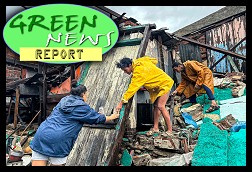 'Green News Report' 10/30/25
'Green News Report' 10/30/25
 Proposal for 'First Politically Viable Wealth Tax' Takes Shape in CA: 'BradCast' 10/29/25
Proposal for 'First Politically Viable Wealth Tax' Takes Shape in CA: 'BradCast' 10/29/25 Monster Storm, Endless Wars, Gamed Elections:
Monster Storm, Endless Wars, Gamed Elections: 'Green News Report' 10/28/25
'Green News Report' 10/28/25 Let's Play 'Who Wants
Let's Play 'Who Wants Sunday 'Cartoonists Dilemma' Toons
Sunday 'Cartoonists Dilemma' Toons Exiled NOAA Scientists Resurrect Critical Disaster Database: 'BradCast' 10/23/25
Exiled NOAA Scientists Resurrect Critical Disaster Database: 'BradCast' 10/23/25  'Green News Report' 10/23/25
'Green News Report' 10/23/25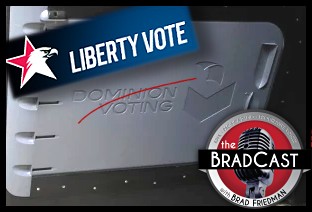 Trump-Allied GOP Partisan Buys Dominion Voting Systems: 'BradCast' 10/22/25
Trump-Allied GOP Partisan Buys Dominion Voting Systems: 'BradCast' 10/22/25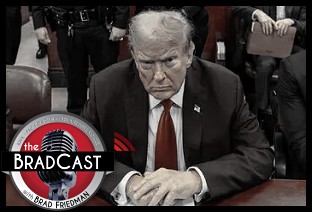 Trump, Republican Law(lessness) & (Dis)Order: 'BradCast' 10/21/25
Trump, Republican Law(lessness) & (Dis)Order: 'BradCast' 10/21/25 'Green News Report' 10/21/25
'Green News Report' 10/21/25 Celebrating 'No Kings': 'BradCast' 10/20/25
Celebrating 'No Kings': 'BradCast' 10/20/25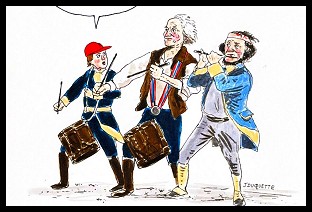 Sunday 'How It Started' Toons
Sunday 'How It Started' Toons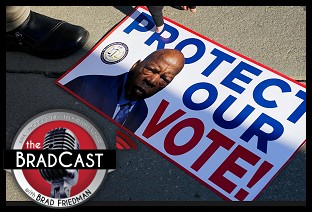 SCOTUS Repubs Appear Ready to Gut Rest of Voting Rights Act: 'BradCast' 10/16/25
SCOTUS Repubs Appear Ready to Gut Rest of Voting Rights Act: 'BradCast' 10/16/25 'Green News Report' 10/16/25
'Green News Report' 10/16/25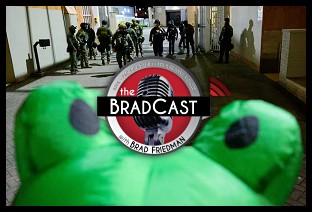 The 'Epstein Shutdown' and Other Autocratic Nightmares: 'BradCast' 10/15/25
The 'Epstein Shutdown' and Other Autocratic Nightmares: 'BradCast' 10/15/25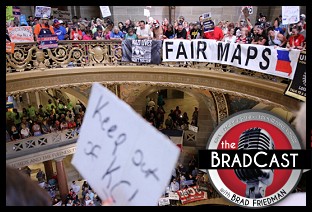 Group Vows to Block MO's GOP U.S. House Gerrymander: 'BradCast' 10/14/25
Group Vows to Block MO's GOP U.S. House Gerrymander: 'BradCast' 10/14/25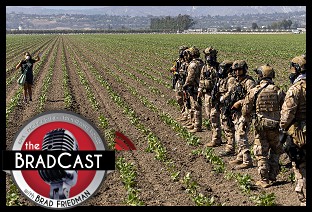 Trump Labor Dept. Warns Trump Policies Sparking Food Crisis: 'BradCast' 10/9/25
Trump Labor Dept. Warns Trump Policies Sparking Food Crisis: 'BradCast' 10/9/25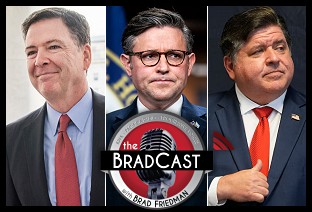 Trump's Losing Battles: 'BradCast' 10/8/25
Trump's Losing Battles: 'BradCast' 10/8/25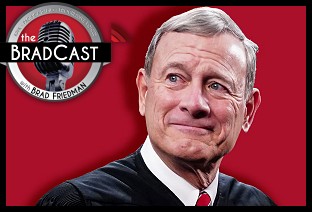 Trump, Roberts and His Stacked, Packed and Captured SCOTUS: 'BradCast' 10/7/25
Trump, Roberts and His Stacked, Packed and Captured SCOTUS: 'BradCast' 10/7/25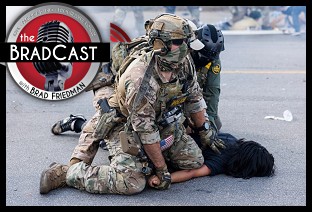 Trump Attempting His 'Invasion from Within': 'BradCast' 10/6/25
Trump Attempting His 'Invasion from Within': 'BradCast' 10/6/25 Biden Budget Expert: Mass Firings in Shutdown 'Illegal': 'BradCast' 10/2/25
Biden Budget Expert: Mass Firings in Shutdown 'Illegal': 'BradCast' 10/2/25 Why is DOJ Suing 'Blue' States for Their Voter Databases?: 'BradCast' 10/1/25
Why is DOJ Suing 'Blue' States for Their Voter Databases?: 'BradCast' 10/1/25
 VA GOP VOTER REG FRAUDSTER OFF HOOK
VA GOP VOTER REG FRAUDSTER OFF HOOK Criminal GOP Voter Registration Fraud Probe Expanding in VA
Criminal GOP Voter Registration Fraud Probe Expanding in VA DOJ PROBE SOUGHT AFTER VA ARREST
DOJ PROBE SOUGHT AFTER VA ARREST Arrest in VA: GOP Voter Reg Scandal Widens
Arrest in VA: GOP Voter Reg Scandal Widens ALL TOGETHER: ROVE, SPROUL, KOCHS, RNC
ALL TOGETHER: ROVE, SPROUL, KOCHS, RNC LATimes: RNC's 'Fired' Sproul Working for Repubs in 'as Many as 30 States'
LATimes: RNC's 'Fired' Sproul Working for Repubs in 'as Many as 30 States' 'Fired' Sproul Group 'Cloned', Still Working for Republicans in At Least 10 States
'Fired' Sproul Group 'Cloned', Still Working for Republicans in At Least 10 States FINALLY: FOX ON GOP REG FRAUD SCANDAL
FINALLY: FOX ON GOP REG FRAUD SCANDAL COLORADO FOLLOWS FLORIDA WITH GOP CRIMINAL INVESTIGATION
COLORADO FOLLOWS FLORIDA WITH GOP CRIMINAL INVESTIGATION CRIMINAL PROBE LAUNCHED INTO GOP VOTER REGISTRATION FRAUD SCANDAL IN FL
CRIMINAL PROBE LAUNCHED INTO GOP VOTER REGISTRATION FRAUD SCANDAL IN FL Brad Breaks PA Photo ID & GOP Registration Fraud Scandal News on Hartmann TV
Brad Breaks PA Photo ID & GOP Registration Fraud Scandal News on Hartmann TV  CAUGHT ON TAPE: COORDINATED NATIONWIDE GOP VOTER REG SCAM
CAUGHT ON TAPE: COORDINATED NATIONWIDE GOP VOTER REG SCAM CRIMINAL ELECTION FRAUD COMPLAINT FILED AGAINST GOP 'FRAUD' FIRM
CRIMINAL ELECTION FRAUD COMPLAINT FILED AGAINST GOP 'FRAUD' FIRM RICK SCOTT GETS ROLLED IN GOP REGISTRATION FRAUD SCANDAL
RICK SCOTT GETS ROLLED IN GOP REGISTRATION FRAUD SCANDAL VIDEO: Brad Breaks GOP Reg Fraud Scandal on Hartmann TV
VIDEO: Brad Breaks GOP Reg Fraud Scandal on Hartmann TV RNC FIRES NATIONAL VOTER REGISTRATION FIRM FOR FRAUD
RNC FIRES NATIONAL VOTER REGISTRATION FIRM FOR FRAUD EXCLUSIVE: Intvw w/ FL Official Who First Discovered GOP Reg Fraud
EXCLUSIVE: Intvw w/ FL Official Who First Discovered GOP Reg Fraud GOP REGISTRATION FRAUD FOUND IN FL
GOP REGISTRATION FRAUD FOUND IN FL

































